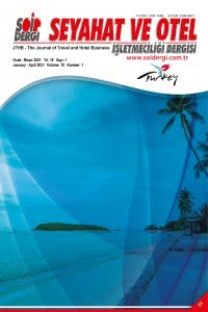Döviz Kuru Oynaklığının Turizm Sektörüne Etkileri: Türkiye Örneği (2002 - 2011)
Turizm sektörü ülkeler açısından önemli bir istihdam aracı olmasının yanında işsizliğin azaltılmasında, bölgesel kalkınma ve döviz gelirlerinin arttırılmasını sağlayarak cari işlemler dengesi üzerinde önemli etkileri bulunan bir sektördür. Dünyada dalgalı kur rejimlerinin yaygınlaşması ve yaşanan global krizler sonucunda döviz kuru oynaklığının artması ekonomi üzerinde önemli etkilere yol açmış, bu ise döviz kuru oynaklığının ekonomik etkilerinin yaygın biçimde tartışılmasına neden olmuştur. Turizm sektörü döviz kurlarından yoğun biçimde etkilenmesine rağmen döviz kuru oynaklığının turizm gelirlerine etkileri konusunda sınırlı sayıda çalışma yapılmıştır. Bu çalışmada Çoklu doğrusal regresyon yöntemi kullanılarak 2002:01-2011:12 aralığında EURO/TL döviz kurundaki oynaklığın Türkiye’nin turizm gelirlerine etkileri incelenmiştir.
Anahtar Kelimeler:
Döviz kuru, döviz kuru oynaklığı, turizm,
The Effects of Exchange Rate Volatility to the Tourism Sector: The Case of Turkey (2002 - 2011)
The tourism sector is an important tool of employment for countries. It also has significant impacts on the current account balance in reducing unemployment, providing regional development and increase in foreign exchange revenues. The worldwide increase in the exchange rate volatility as a result of the spread of floating exchange rate regimes and the global crises has caused significant effects on the economy. That has led to widespread discussions about the economic effects of the exchange rate volatility. Although the tourism sector is highly effected by the exchange rates, there is a limited number of studies on the effects of the exchange rate volatility in the tourism revenues. In this study, using the method of Multiple linear regression, in the range of 2002: 01-2011: 12, the effects of EURO/TL exchange rate volatility on Turkey's tourism revenue are analyzed.
Keywords:
Exchange rate, exchange rate volatility, tourism.,
- ISSN: 1304-7590
- Yayın Aralığı: Yılda 3 Sayı
- Başlangıç: 2004
- Yayıncı: Sidas Medya Ajans Tanıtım Danışmanlık Ltd. Şti.
Sayıdaki Diğer Makaleler
A. Celil ÇAKICI, MURAT ÖZDAMAR
Otel İşletmeleri İçin Faaliyet Tabanlı Bütçeleme Modeli Önerisi
LÜTFİ MUSTAFA ŞEN, SELİM YÜKSEL PAZARÇEVİREN
Döviz Kuru Oynaklığının Turizm Sektörüne Etkileri: Türkiye Örneği (2002 - 2011)
Vahdet KAYA, SERAP ÇAKIR ÇÖMLEKÇİ
Kadın Çalışanların Müşteri Memnuniyetine Etkisinin Değerlendirilmesi
